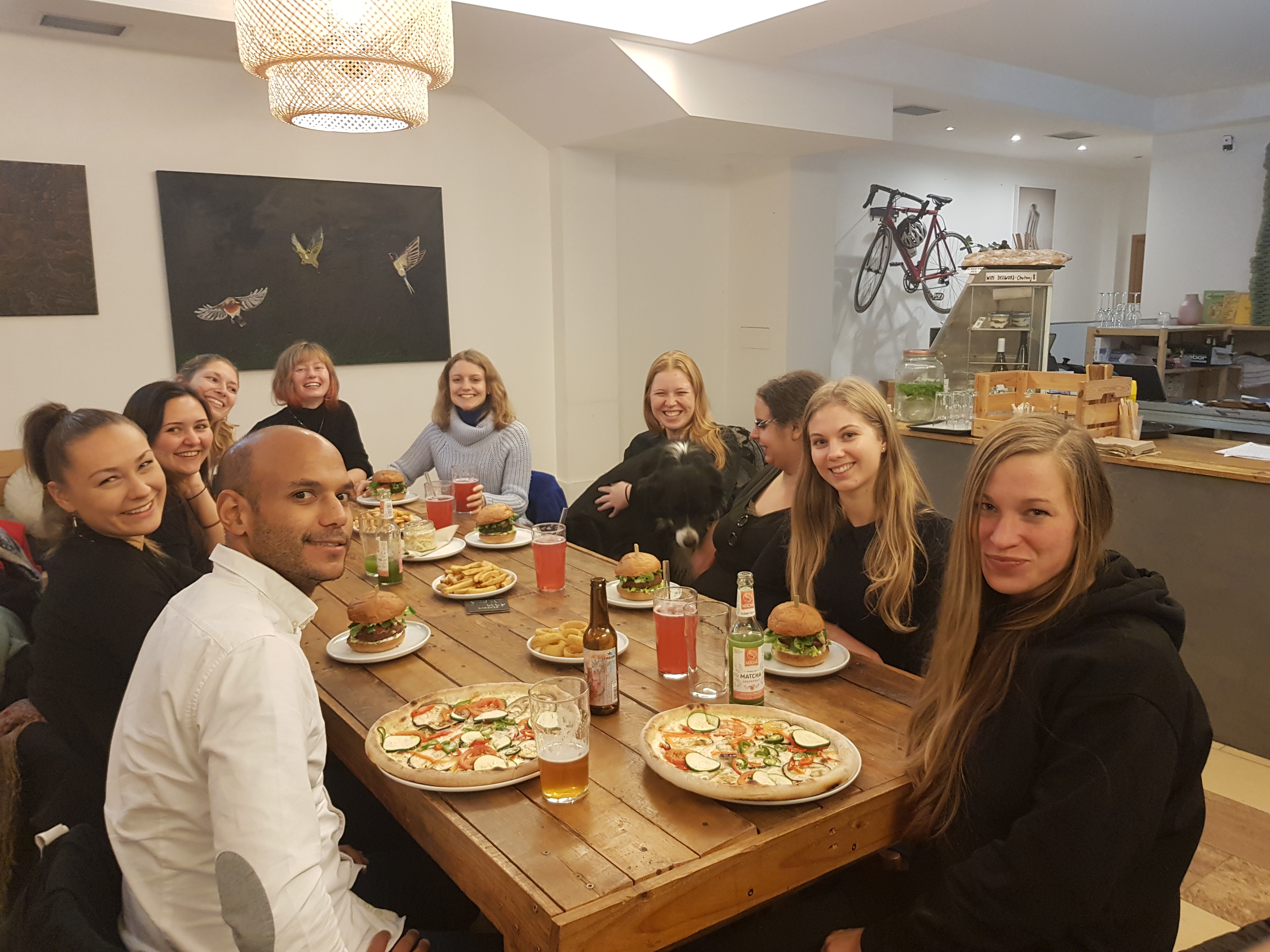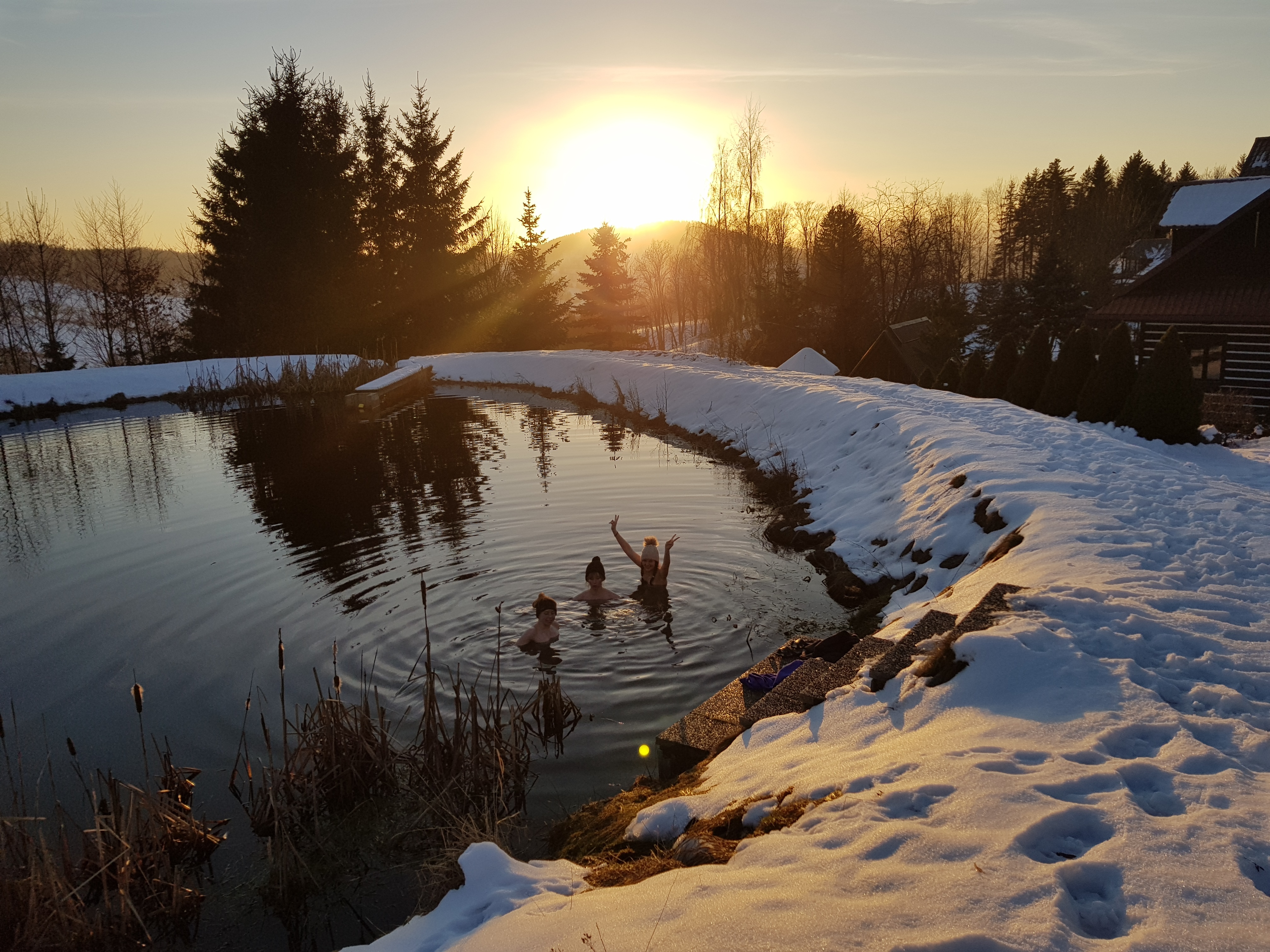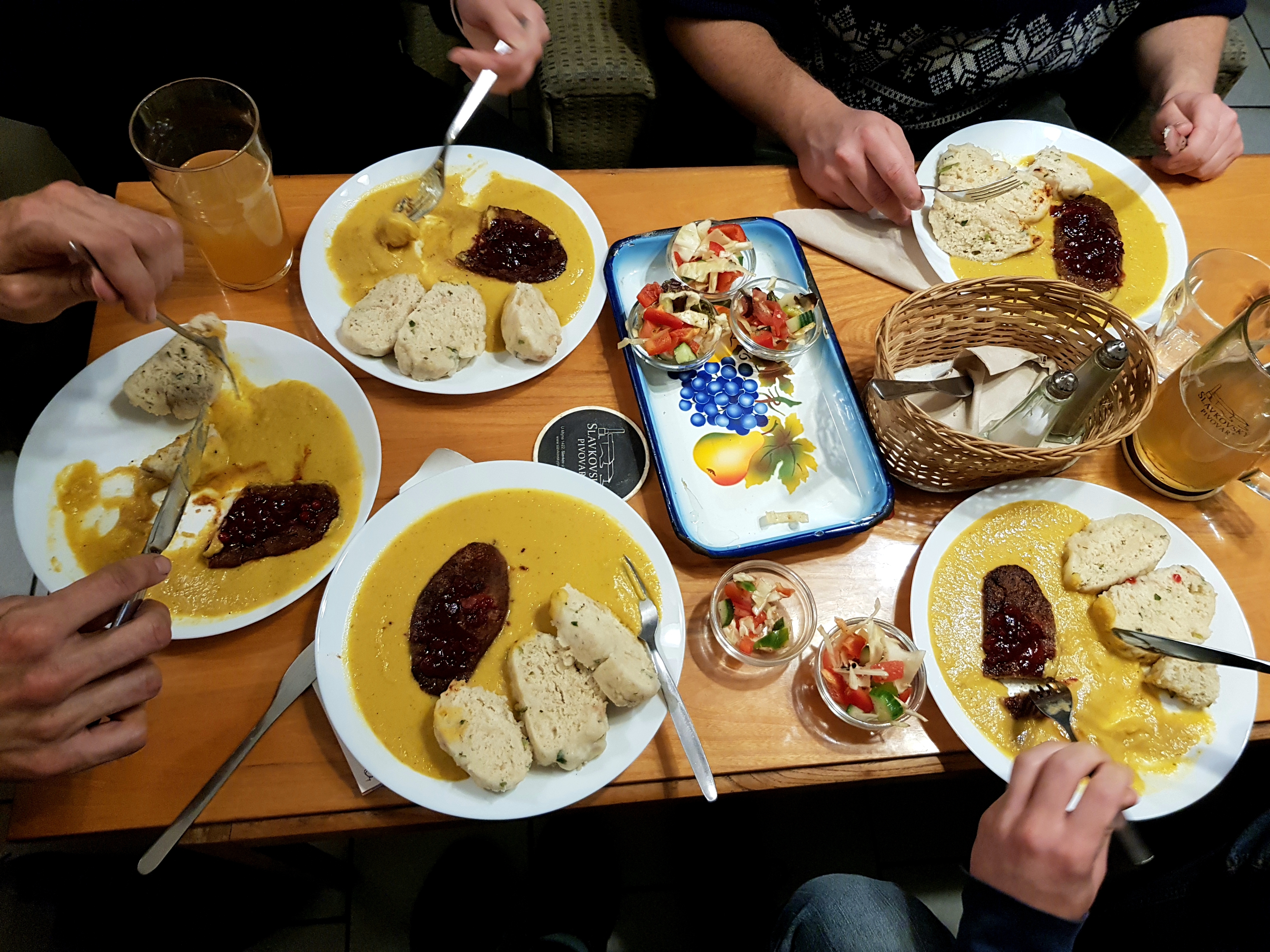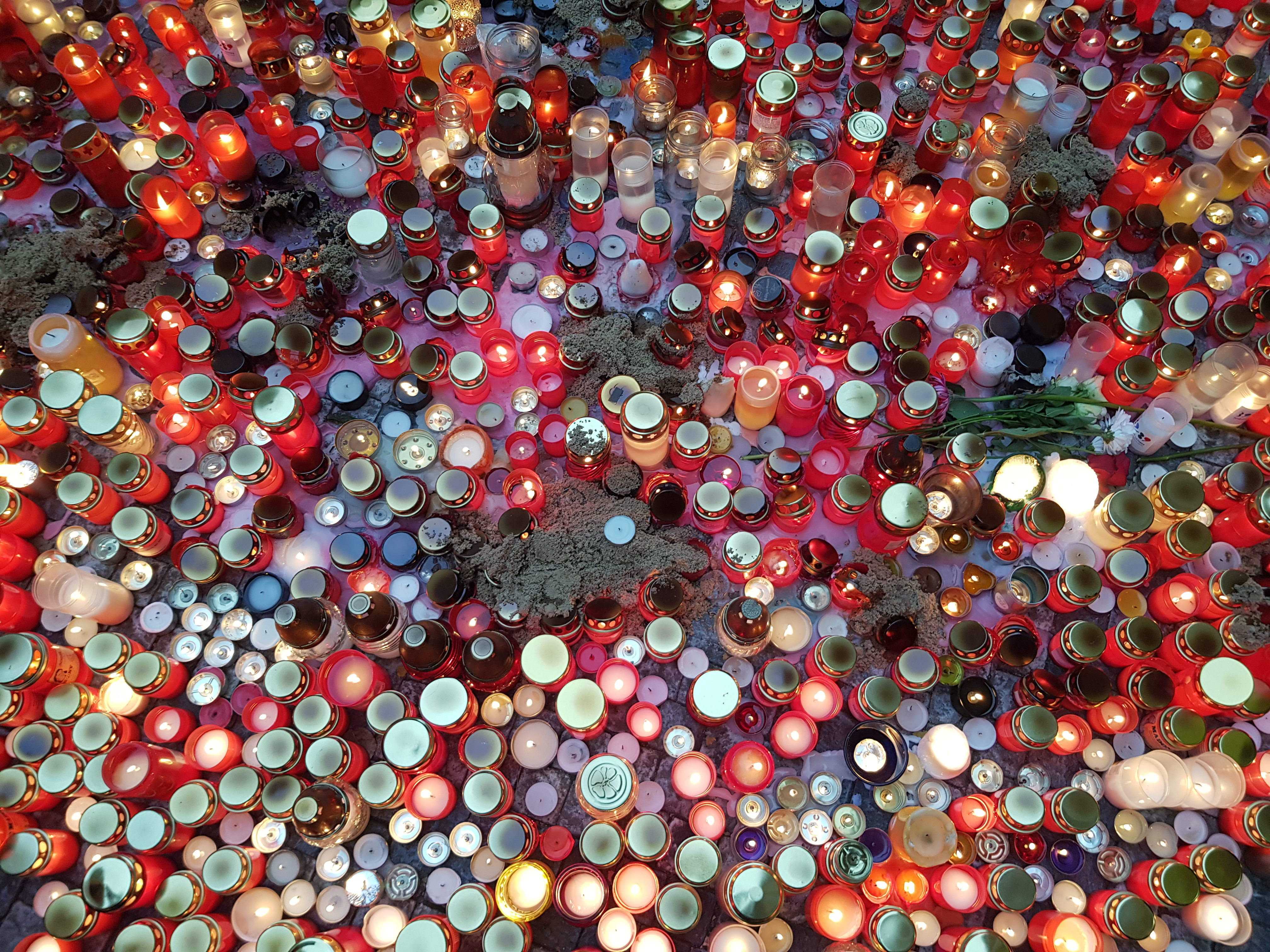Between workcamps, Czech language and vegan Pizza: after twelve months, our ESC volunteer from 2021 Jule sums up her voluntary year at our partner organization INEX-SDA and in the Czech Republic:
"It was 7:40 pm on Wednesday third of February 2021 when I arrived at Prague central station packed like a donkey with my heavy suitcases and backpacks. My mentor was awaiting me at the platform to welcome me in Prague and guide me to the flat I would be living in during my ESC project period. I was full of expectations, curiosity and relieve together with IBG I have found an opportunity abroad during pandemic times. Now, looking back at this moment, I realize how much that year in Prague with INEX has taught me.
Before diving into those memories and learnings, though, let’s just quickly cover some hard facts about ESC, so we are on the same page and you know what I am actually talking about:
What is ESC?
ESC stands for European Solidarity Corps, which is, first of all, a European platform and a network, which numerous non-profit and non-governmental organizations and associations in Europe are part of. These organizations offer a huge number of diverse short- and long-term voluntary opportunities and internships up to twelve months for European residents between 18 and 30 years old, like me.
My ESC project at INEX
INEX offered such a voluntary one-year-project as a so called incoming officer. Since I did and lead some workcamps in Germany and Japan previously, liked the approach of non-formal education within intercultural environments and was interested to get more insights into the whole workcamp cycle and coordination, I was super thrilled.
For me, this seemed to be a perfect opportunity to firstly, go abroad, secondly, to get some more hands-on work experience and that, thirdly, within a well known workcamp organization.
As an incoming officer, you generally need to take care of all the applications from volunteers for the workcamps coordinated in your organization’s country. It means administrative and practical support during the workcamp cycle: for setting up the workcamps and trainings (the „warm-up phase“), for the time when they are actually running (the „hot phase“) and for procedures after they are finished (the „slowly-cooling-down phase“). It means intense communication with other organizations, volunteers, campleaders, colleagues etc., traveling to rural workcamp locations through the whole country plus lots of paperwork – so in short, quite a coordinative challenge while getting to know many projects, municipalities, organizations, places and people in the Czech Republic.
It was exactly what I wanted to face. It sounded literally like my dream. But did it turn out as I expected it to be? Well, kind of. As much as an imagination in your head can match reality I would say. But it definitely gave me much more than expected. For example new good friends, like my mentor who was picking me up from Prague central station on my day of arrival. It also gave me pretty tough and rough times.
If you are interested in how it went for me as an ESC volunteer or even striving for an ESC project yourself, you can follow me into a small retrospective.
Of course, the experiences with ESC projects can vary a lot. It depends on many factors, such as your hosting organization, your work, tasks and work environment, the place you are located at, the people you meet, and maybe most importanly, yourself, how you deal with changes, challenges and conflicts. And oh boy, there are usually many. I would like to draw a realistic picture of my ESC experience at this point. Feeling content about decisions, work and relationships was naturally a part of it as much as feeling conflicted, stressed, lonely and anxious.
How was it to work at and with INEX-SDA?
Getting to know the whole workcamp cycle from the organization’s side was as much enriching as it was exhausting, and I am glad to having ended it with many new professional, communicative and self management skills. It enabled me to talk to many different organizations and also volunteers from all over Europe and sometimes beyond, so I realized how well we can be connected with each other cross-boarders.
Beside my tasks as an incoming officer, INEX gave me several opportunities to engage in other side projects. For example I could support the editorial with the podcast DOBRO.cast (another ESC volunteer and me also recorded two English episodes), helped and cooked during trainings and even took part at workcamps as a campleader and gained more social media experience through Instagram handovers. You can read more about other campleaders’ and my stories in some INEX articles like this one.
Probably, the most important and toughest learning outcome from my ESC time at INEX comes exactly from the large variety of great things to do: being able to set and reduce priorities, the importance of consistent communication and being able to say no. My time there further taught me to find the true value of an appreciative and non-hierarchical work atmosphere.

Almost the whole INEX team enjoying our vegan team dinner
Thanks at this point to my colleagues and coordinator who let me learn from my mistakes and experiences, for making work fun, for the many laughs and crazy ideas. The INEX team somehow always had an open ear, gave me tips from about how to deal with hundreds of e-mails a day over nice hiking trails to creative recipes, restaurants or possibilities for dumpster diving. I enjoyed their company at all times and I am very thankful that they were supportive and patient with me.
And beside work?
Of course, the ESC period not only consists of volunteering at an organization. It is also about living in another country and getting sensitized towards other local routines, costumes, languages and people with multiple backgrounds.
Before the start of my ESC period, I was aware that moving abroad usually comes along with overwhelming situations. I remember feeling even nervous about talking in Czech to cashiers in the supermarkets in the beginning because I would not understand anything they said in response. Several months later, I felt more secure about having those conversations also with friends and colleagues, but still felt uncomfortable in only Czech speaking environments. It was just hard for me to estimate what I can and want to say in Czech and also at times native speakers just cannot realise when normal situations and conversations turn out to be quite stressful and challenging for me as a language learner.
Now, one year later, it looks a bit different and I feel much more confident. On the one hand, because I kept confronting myself with these situations and continued to study, learn and talk to people; on the other hand also because I learned to enjoy to sometimes feel like a fish out of water, to enjoy this language process, those interesting and funny communicative moments with strangers, who were almost always so willing to support me. It does not necessarily mean that I will NOT cry the next time I have frustrating conversations in Czech full of misunderstandings with bureaucrats on the phone – but it means, that I learn from it, understand my reactions much better, can cry with confidence and also know which situations I can handle and for which I would like to ask for help.
And this also applies to several other situations.
Like not having close friends and family, I could normally reach out to so easily, around me anymore. Even though I enjoy time with myself and see lots of value in exploring places only by myself, there were some situations I could have used the real-life company of a long known friend or that I would have liked to share with them. Especially around the sixth month of living in the Czech Republic, I felt like losing ground with people. My best friends were not around, and at times I wasn’t even sure if I had any „real“ friends in Prague or if it wasn’t just short-term friendships out of convenience. However, this is part of the experience moving and living abroad and of course I wanted to be patient with myself and the new relationships that were just about to form. So I found ways to deal with more things on my own, me and my old friends developed new ways of communication and I put more effort in connecting with friends who were physically around me to see what would grow out of it. And well, what can I say, amazing things were growing eventually and continue doing so, just as my language skills are still in progress.
Another essential was to discover places and spots in Prague and beyond in a way that created a connection between me and these places and also to get to know Prague as a city and its citizens. I remember that in the first weeks, I was walking in and around Prague for hours on a daily basis to get a sense of orientation and to be able to move around confidentally in future. Well, also due to the pandemic lockdown and walking outside was one of the few things you were allowed to do :D But the point is that now I can definitely say to be getting along in Prague after many times of getting lost or taking the tram in the wrong direction.
It takes a lot to know a new place and to feel home in new surroundings. You have to find your own ways to reach this level of comfort, get to know yourself better and challenge yourself and others, but this way is an adventure and once you are there you can be really proud of yourself.
A few personal highlights from the Czech Republic
When I think about the last year in Czechia, especially small moments pop up in my head. Most of them actually come from amazingly beautiful Czech landscapes: the first time staring at Prague and Vltava river from a viewpoint in Braník; the first time seeing a massive amounts of sand in a forest in Toulovcovy Maštale coming from sandstone of the stunning rock formations; ice-bathing in a freezing lake during sunset in Krkonoše mountains (the Czech expression „otužování“ literally means „tempering“ body and spirit); climbing through caves in South Moravia; hiking through one of the Moravian wine regions Znojmo while sipping Burčák (young sweet wine only available at the beginning of the wine season in early autumn); or basically the views from almost every viewpoint in the Czech Republic (which they have a lot of, because Czech landscape is super hilly).

Otužování in Rokytnice
Living in Prague was of course a highlight itself.
After discovering the capital for one year, I am still struck by its beauty sometimes when just walking through alleys, bumping into yet another historically valuable building or monument or interesting piece of socio-critical art hidden in some corner or multifunctional space or cinema or restaruant or cafe or bar and the list goes on and on.
A few lines, I would also like to dedicate to the huge variety of vegan restaurants and options in Prauge. I can recommend trying some vegan versions of Czech traditional food, like vegan Svíčková (marinated sirloin in cream sauce) or vegan Smažák (fried cheese usually served with fries and tartar sauce). There was one particular vegan Pizza and Burger restaurant, where I had lots of fun trying the whole menu during the whole year and I enjoyed every dish.
Beside great vegan cuisine, I have never seen so many and various kinds of domestic dogs in one place and in almost every Czech home I have been invited to, there was at least one dog or cat to give cuddles to.

Yummy vegan Svíčková

Ocean of candles on Narodní Třida in Prague on the Day of Struggle for Freedom and Democracy (Den boje za svobodu a demokracii) 17.11.21
To sum it up:
Not only did I learn heaps about the Czech Republic, INEX as an NGO, the international workcamp networks, its values, workcamps and campleading; moreover it gave me uncountable connections to places, friends and acquaintences as well as many opportunities, inspirations and ideas for the future.
It might sound cheesy, but here I learned how to appreciate my life and myself in a new way. I feel so comfortable and home, so that, in fact, I chose to turn the temporary one-year stay into a permanent stay and stay for good.
Consequently, I suppose you could say, the program of the ESC was successful and even exceeded its goals for me. After all, I started with a vision and finished with the realisation that this vision came to life in a much better way than I expected.
I came to look for a future perspective in another European country, develop my professional skills – and ended up with a job and tons of project ideas.
I came to get to know others – and ended up with a precious network of friends and colleagues with lots of room for more exploration.
I came on 7:40 pm on Wednesday third of February 2021 to Prague central station, packed like a donkey with my heavy suitcases and backpacks, full of expectations and curiosity. Now, looking back at it, I realize that I came to stay in the first place.
I hope to have given you an overall overview over my ESC project and what is possible to take from it. If you got inspired and would like to start your own ESC journey, why not have a look at the ESC portal itself?
Here you can also find stories of other IBG volunteers joining workcamps in the Czech Republic and other countries.